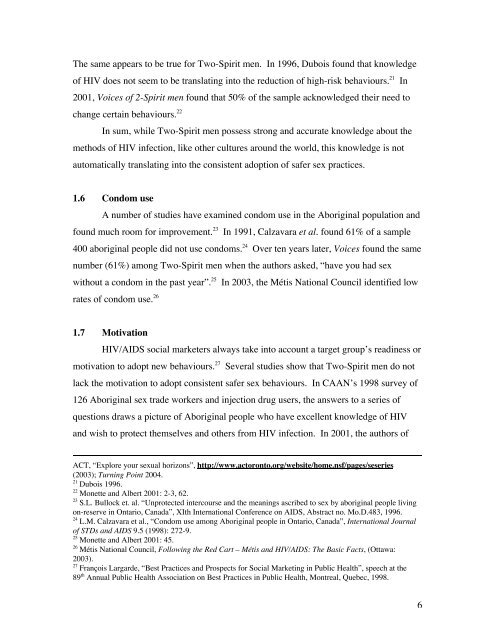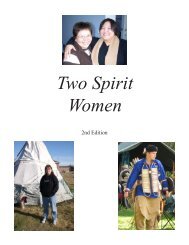Leading an Extraordinary Life: Wise Practices for an HIV ... - 2 Spirits
Leading an Extraordinary Life: Wise Practices for an HIV ... - 2 Spirits
Leading an Extraordinary Life: Wise Practices for an HIV ... - 2 Spirits
You also want an ePaper? Increase the reach of your titles
YUMPU automatically turns print PDFs into web optimized ePapers that Google loves.
The same appears to be true <strong>for</strong> Two-Spirit men. In 1996, Dubois found that knowledge<br />
of <strong>HIV</strong> does not seem to be tr<strong>an</strong>slating into the reduction of high-risk behaviours. 21 In<br />
2001, Voices of 2-Spirit men found that 50% of the sample acknowledged their need to<br />
ch<strong>an</strong>ge certain behaviours. 22<br />
In sum, while Two-Spirit men possess strong <strong>an</strong>d accurate knowledge about the<br />
methods of <strong>HIV</strong> infection, like other cultures around the world, this knowledge is not<br />
automatically tr<strong>an</strong>slating into the consistent adoption of safer sex practices.<br />
1.6 Condom use<br />
A number of studies have examined condom use in the Aboriginal population <strong>an</strong>d<br />
found much room <strong>for</strong> improvement. 23 In 1991, Calzavara et al. found 61% of a sample<br />
400 aboriginal people did not use condoms. 24 Over ten years later, Voices found the same<br />
number (61%) among Two-Spirit men when the authors asked, “have you had sex<br />
without a condom in the past year”. 25 In 2003, the Métis National Council identified low<br />
rates of condom use. 26<br />
1.7 Motivation<br />
<strong>HIV</strong>/AIDS social marketers always take into account a target group’s readiness or<br />
motivation to adopt new behaviours. 27 Several studies show that Two-Spirit men do not<br />
lack the motivation to adopt consistent safer sex behaviours. In CAAN’s 1998 survey of<br />
126 Aboriginal sex trade workers <strong>an</strong>d injection drug users, the <strong>an</strong>swers to a series of<br />
questions draws a picture of Aboriginal people who have excellent knowledge of <strong>HIV</strong><br />
<strong>an</strong>d wish to protect themselves <strong>an</strong>d others from <strong>HIV</strong> infection. In 2001, the authors of<br />
ACT, “Explore your sexual horizons”, http://www.actoronto.org/website/home.nsf/pages/seseries<br />
(2003); Turning Point 2004.<br />
21 Dubois 1996.<br />
22 Monette <strong>an</strong>d Albert 2001: 2-3, 62.<br />
23 S.L. Bullock et. al. “Unprotected intercourse <strong>an</strong>d the me<strong>an</strong>ings ascribed to sex by aboriginal people living<br />
on-reserve in Ontario, C<strong>an</strong>ada”, XIth International Conference on AIDS, Abstract no. Mo.D.483, 1996.<br />
24 L.M. Calzavara et al., “Condom use among Aboriginal people in Ontario, C<strong>an</strong>ada”, International Journal<br />
of STDs <strong>an</strong>d AIDS 9.5 (1998): 272-9.<br />
25 Monette <strong>an</strong>d Albert 2001: 45.<br />
26 Métis National Council, Following the Red Cart – Métis <strong>an</strong>d <strong>HIV</strong>/AIDS: The Basic Facts, (Ottawa:<br />
2003).<br />
27 Fr<strong>an</strong>çois Largarde, “Best <strong>Practices</strong> <strong>an</strong>d Prospects <strong>for</strong> Social Marketing in Public Health”, speech at the<br />
89 th Annual Public Health Association on Best <strong>Practices</strong> in Public Health, Montreal, Quebec, 1998.<br />
6



